Verdict
A multi-talented digital audio player with a barrel load of features, the FiiO M11S entertains with its balanced, consistent performance across a range of sources. It’s a worthy travel companion to go with your smartphone of choice.
Pros
- Balanced, informative sound
- Easy to use
- Colourful display
- Android integration
- Wide specification
Cons
- Some may hanker for more excitement
- Fairly big in size
Availability
- UKRRP: £489
- USARRP: $499.99
- EuropeTBC
- CanadaTBC
- AustraliaTBC
-
ModesSwap between Android, Music, AirPlay, Roon, and more -
Hi-Res AudioSupports file formats up to 32-bit/384kHz and DSD256 -
Android modeDownload third-party apps from Google Play Store
Introduction
I keep hearing there’s no place for a portable music player in today’s world with the smartphone, but someone somewhere must be buying – otherwise you wouldn’t be reading this review.
If anything, portable music players have become more like smartphones, adopting similar interfaces, touchscreens and being just as easy to operate.
The FiiO M11S is a portable music player that operates like a smartphone with its Android UI. Some may still feel their smartphone does everything they need it to, but the FiiO M11S has different ideas.
Design
- Bright, colourful display
- Much heavier than a smartphone
- Balanced/line outputs
The best way to describe the M11S would be a comparison to a one of the best phones around. It is thicker than the Samsung Galaxy S23 (18.5mm vs 7.6mm), heavier (271g vs 168g) and has a smaller screen (5-inches vs 6.1).
But despite its larger dimensions, it is considerably well-built from all angles. The 5-inch IPS screen has a 720p resolution, and text is sharp and clear to read. The screen is colourful – album artwork looks great – and it’s bright, though not bright enough to withstand the glare of a sunny day.

The M11S comes with a clear case and the screen already has a protector pre-applied, though these reduce the player’s overall aesthetics. The rear of the M11S is glass which gives the unit a premium finish. Any fingerprints and smudges can be easily wiped off.
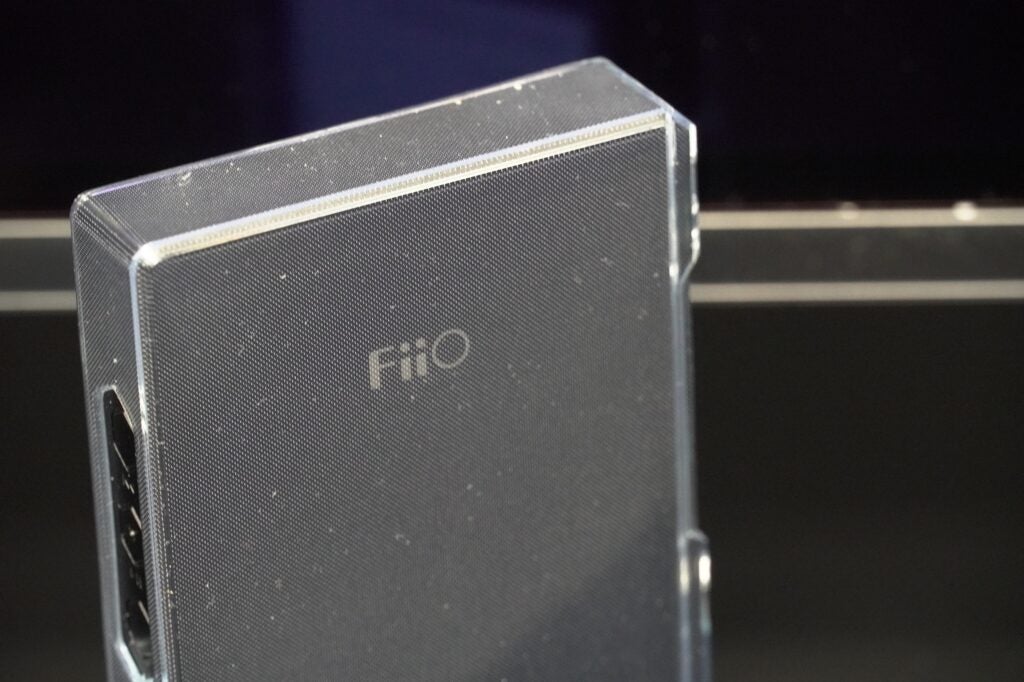
Operating the FiiO M11S took me a little while to figure out. There’s no control wheel for volume like there is on Astell & Kern players but a checkerboard-styled rocker on the left side. Pressing towards the top bumps volume up and vice versa at the bottom does. Above the volume control is a button for power/screen on/off and beneath the rocker is a customisable button. Like an Android smartphone, hold the power and volume buttons together and you can take a screenshot.

The ergonomics of the M11S in terms of shape and size suit me holding it in my left hand; thumb on the left side, with index, and middle for playback control on the right, and then operating the screen with my right hand. I didn’t experience issues shuffling my digits about to cover the buttons, the placement of which seems well thought out.
On the right-hand side are playback buttons, and below that is the microSD slot. Inputs are on the bottom which is the conventional way of doing things but also means that the player will be upside down in a pocket during use. I’m not sure if I prefer this way or the Astell & Kern method of putting them at the top – either works really.
Those inputs, before I forget, are USB-C to USB-A (for charging or turning it into a USB DAC), along with a 2.5mm balanced out, 3.5mm out/line-out/coaxial out and a 4.4mm balanced/line output. The M11S only comes in black.
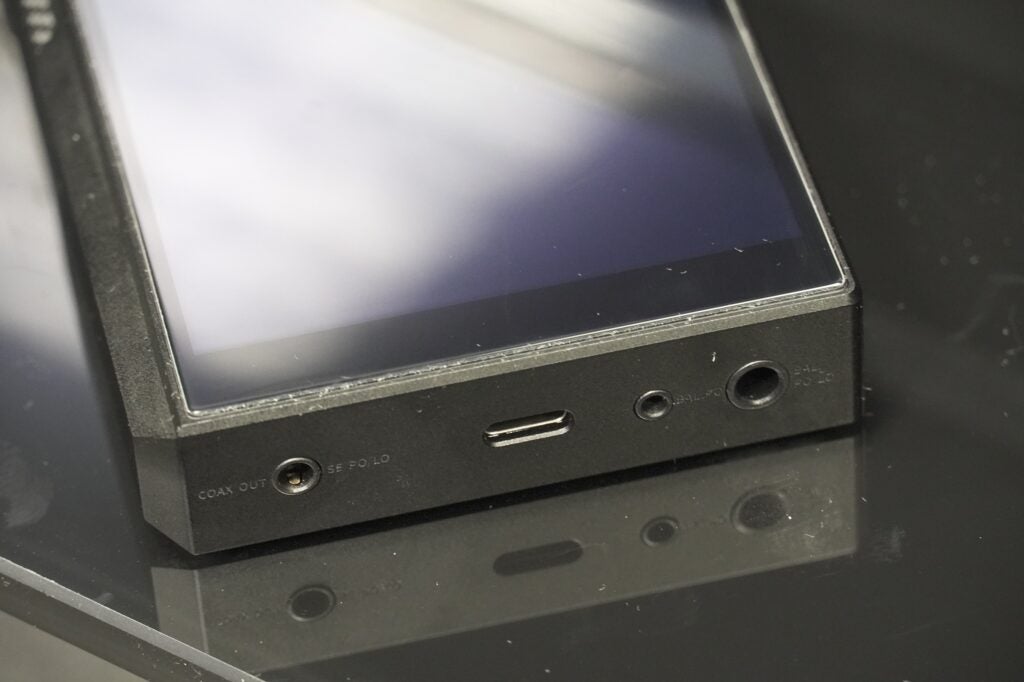
Features
- Dual DAC design
- Hi-res audio support
- 14-hour battery life
Equipped with two ESS ES9038Q2H DACs to cover the right and left channels, the M11S uses FiiO’s 4th Gen FPGA (Field Programmable Gate Arrays) with phase-locked loop technology. Some digging online infers the circuit constantly adjusts to match the frequency of the input signal it is receiving.
And working in conjunction with dual custom femtosecond crystal oscillators, the idea is this set-up offers “elevated precision” and low jitter (digital audio errors) to produce a clean audio performance. File support is up to 32-bit/384kHz and DSD256, and there are three levels of gain to choose from low, medium, and high: depending on a headphone’s impedance.
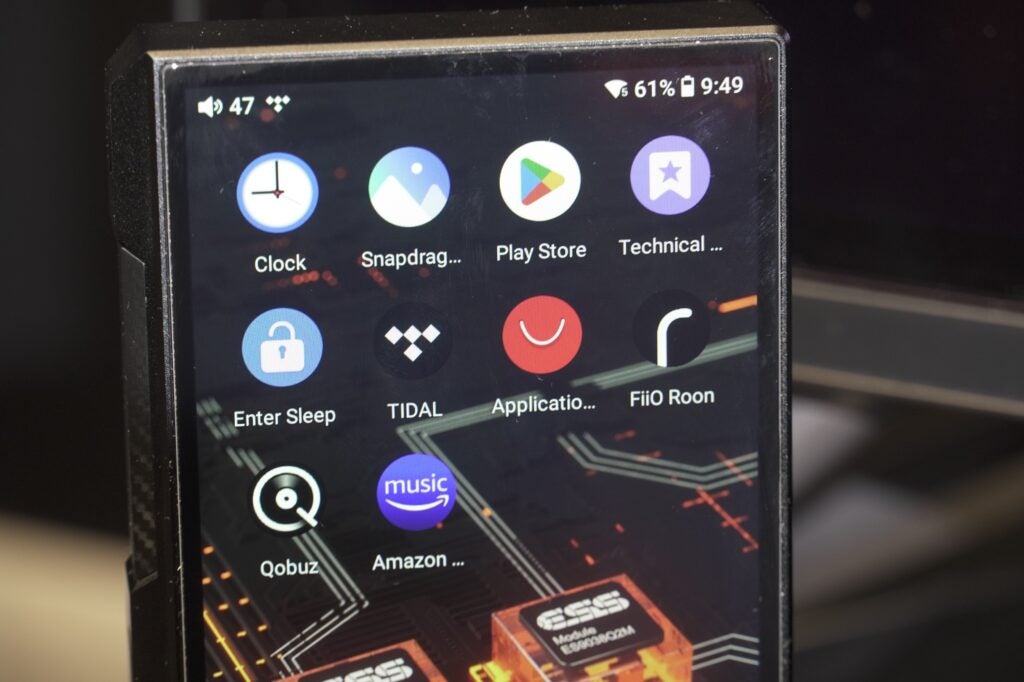
There’s Android OS support customised to the M11S’ needs, and like the FiiO R7 it offers the full Android performance. Having Android is useful in that if you connect a pair of Bluetooth headphones you can download its corresponding app. Android seems better suited here for portable use than it is on the R7 desktop amplifier.
A swipe down brings the quick menu settings, and you can swipe away notifications like you would on a smartphone.
There are different menus too, from Android (for installing apps) to the Pure (or FiiO) Music interface, Bluetooth receiving, USB DAC, and AirPlay modes.
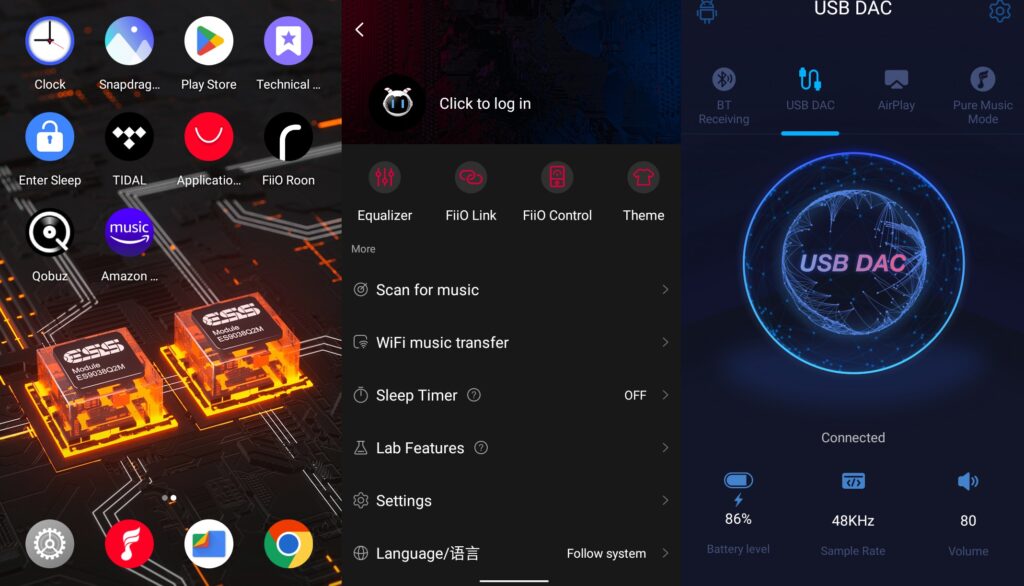
The touchscreen offers a swift response to presses and swiping gestures, and navigation is fluid with no lag or slowdown. The player comes with 3GB of RAM and Qualcomm’s Snapdragon 660 chipset. That’s a mid-range chip from a few years ago, equivalent to what’s in the Xiaomi Redmi Note 7 or Samsung Galaxy A9.
32GB of internal storage is provided but that can be expanded with microSD cards up to 2TB. The 1300mAH battery claims to offer 14 hours of service before recharging. Streaming a playlist from Amazon Music for an hour at 50% volume brought the battery life down by 7% and that’s on target for the 14-hour total. Should you up the volume the overall battery life will fall to less than that.
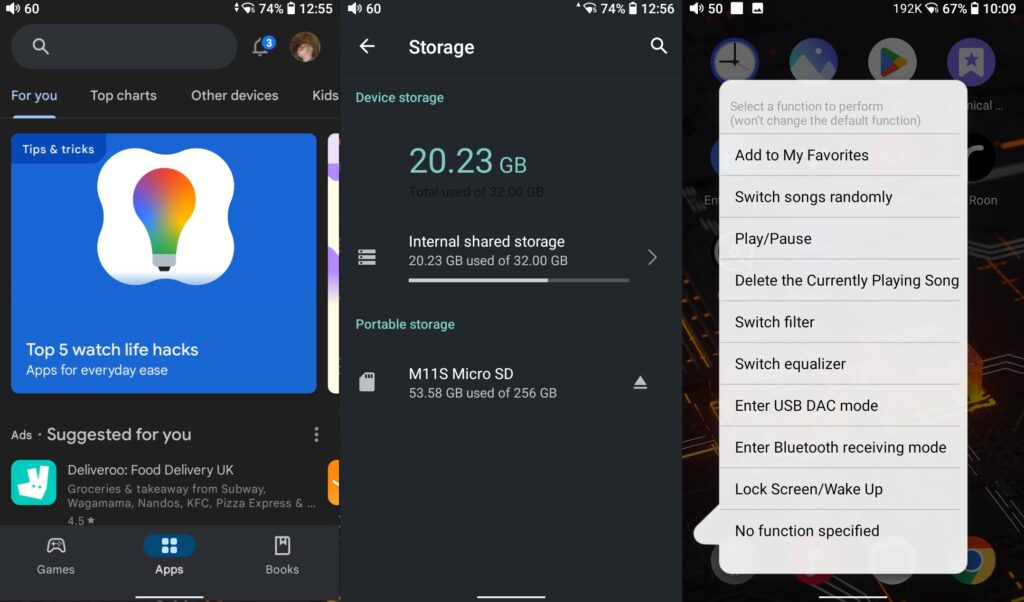
Other features include full unfolding of MQA files for best quality performance. The Global SRC bypass overrides Android’s Sample Rate Conversion for bit-perfect playback, and there’s Roon Ready support as well.
Bluetooth 5.0 is included with the M11S able to receive SBC, AAC, and LDAC codecs, as well as transmit those codecs along with aptX, aptX HD, LDAC and LHDC for higher quality wireless playback. There’s also Wi-Fi in the form of 2.4 and 5GHz connectivity.
Performance
- Balanced, uncoloured sound
- Informative detail levels across frequency range
- Measured bass delivery
If you’ve read my FiiO R7 review, it shouldn’t be a surprise that the FiiO M11S adheres to a similar approach. It’s a neutral delivery, perhaps not the showiest performance, but its balanced approach is more than satisfactory.
With a pair of Sennheiser IE 200 in-ears and a stream of Academic Decommitment from the Spider-Man: Homecoming soundtrack; the FiiO M11S outputs a spacious soundstage that’s knitted together well, featuring strong levels of detail and an enjoyable impression of the track’s dynamics.
It’s a very measured, balanced, and studious performance – you can feel the M11S’ hand directing playback but not always in an obvious way. The FiiO sounds natural – neither warm nor particularly crisp, music has a solidity to it, and distortion is minimal if there is any at all.
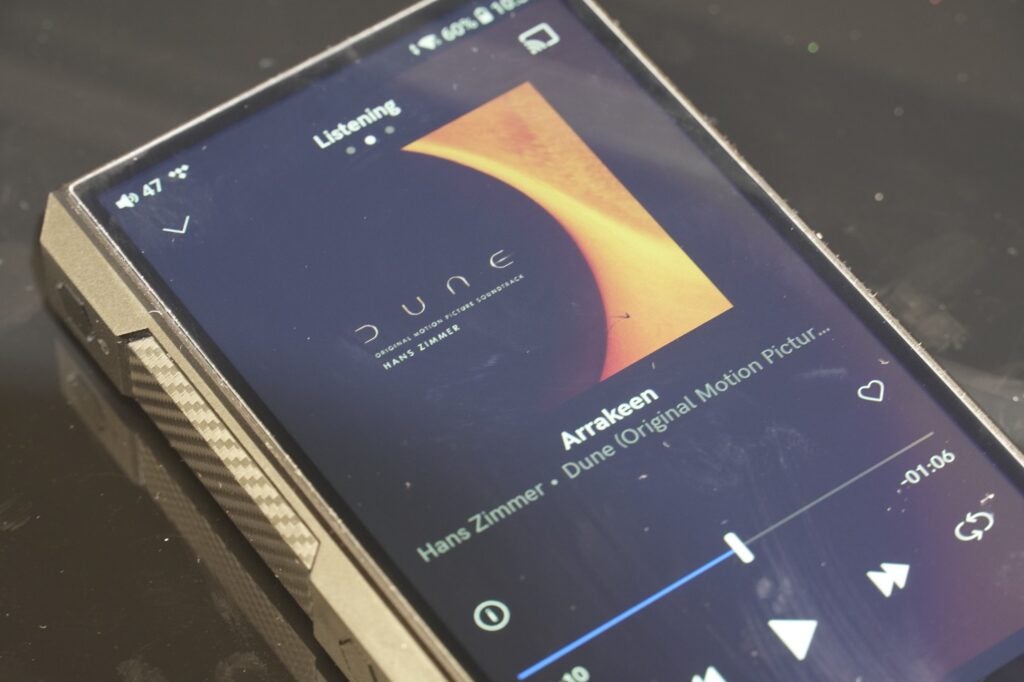
A switch to a pair of Sivga Robin SV021 and the FiiO’s tone remains consistent. Sticking with Spider-Man – this time the Across the Spider-Verse soundtrack – and that measured approach is noticeable in the opening track’s percussive notes. Bass doesn’t dominate proceedings, but the low frequencies have weight, and track as a whole is energetic and dynamic.
With GoGo Penguin’s Raven – a test track favourite of mine – the M11S’ reproduction of the piano is nicely bright and sharp. I can hear lovely variation in the piano notes as they articulately ascend and descend, standing out with fine clarity among the fast beats and cymbal crashes. Even when treble notes don’t register a higher level of brightness or sharpness, they are always described in clear terms.
The midrange is presented in informative terms with Mitski’s Stay Soft, which is relayed with bundles of detail, definition, and clarity. Mitski’s soulful voice comes through clearly, smoothly and with a natural disposition. Instruments are well defined – the sense of separation between instruments is not keenly felt I’d add, but not missed either. The sound the M11S creates is a coherent one.
The FiiO’s sense of organization of its soundstage is perhaps its most impressive trait – there’s a neat and tidy sense of how it goes about its business, seemingly unflustered by whatever information it needs to feed to the listener. Dynamically it goes from loud to quiet and vice versa with composure, though this area does reveal an aspect of the FiiO that might be a slight letdown.
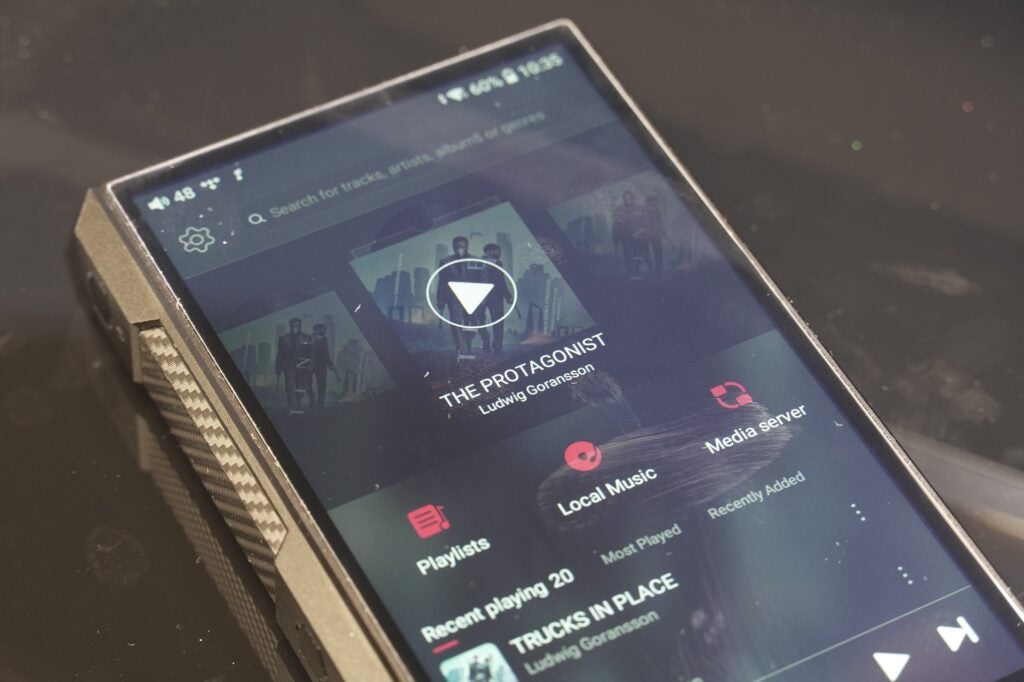
I wouldn’t describe FiiO as the most energetic or attacking performer. It can provide an enjoyable sense of momentum and drive, but also feels as if it’s holding something back. It’s this area where the controlling hand of the FiiO feels more obvious, and where the Astell & Kern SR35 feels livelier and more energetic.
Connected with a pair of Bluetooth wireless headphones – the Sony WH-1000XM4 – and like the FiiO R7, the performance is mostly fine. It takes the same neutral approach, tempering the Sony’s richer sound but audio isn’t as detailed or as dynamic sounding as wired headphones. The volume needs raising too, to derive a more energetic sense of flow and drive.
The USB DAC performance is an improvement over plugging headphones straight into my Lenovo laptop. After some experimentation with the volume, I found the top end of the frequency was brighter, the soundstage bigger in size, and the FiiO extracting a more dynamic performance than my laptop could; though I found with some tracks that the midrange was a little more detailed on my laptop than the M11S.
Latest deals
Should you buy it?
A multi-talented digital audio player: A portable player, USB-DAC, AirPlay, and Bluetooth receiver in one form. If you want to improve your music listening experience, the FiiO covers the bases.
You want a little more excitement: The FiiO’s overall approach to sound is a measured and balanced one. If you’re after more sonic fireworks, the Astell & Kern SR35 might be of more interest.
Final Thoughts
Like the R7, the FiiO M11S is a product with an exhaustive spec. It covers pretty much every area you could want from a digital audio player; its flexibility is impressive and if I was to compare it to a smartphone in audio terms, it’s easily the better option.
But will prospective customers want to have two players in their pockets? I suspect not, but all that means is the FiiO would sit in a bag to be brought out when the occasion calls for it. Its feature set is broad, and its Android integration makes more meaningful sense here than it does on the R7 desktop amplifier.
And most importantly it sounds good, putting in a balanced and composed performance, though I’d argue for some more punch and energy in some areas. Nevertheless, the M11S is a likeable personal music player from FiiO at a more affordable price than its Astell & Kern SR35 rival.
How we test
We test every portable music player we review thoroughly over an extended period of time. We use industry standard tests to compare features properly. We’ll always tell you what we find. We never, ever, accept money to review a product.
Find out more about how we test in our ethics policy.
Tested across several months
Tested with real world use
FAQs
The FiiO M11S supports an extensive list of formats, that include up to DSD256, 24-bit/352.8K DXD, APE formats up to 24-bit/384kHz, Apple Lossless up to 32-bit/384kHz, AIFF, FLAC, and WAV up to 32-bit/384kHz, WMA Lossless up to 24-bit/192kHz, as well as MQA, MP3, OGG, and AAC.
Verdict
A multi-talented digital audio player with a barrel load of features, the FiiO M11S entertains with its balanced, consistent performance across a range of sources. It’s a worthy travel companion to go with your smartphone of choice.
Pros
- Balanced, informative sound
- Easy to use
- Colourful display
- Android integration
- Wide specification
Cons
- Some may hanker for more excitement
- Fairly big in size
Availability
- UKRRP: £489
- USARRP: $499.99
- EuropeTBC
- CanadaTBC
- AustraliaTBC
-
ModesSwap between Android, Music, AirPlay, Roon, and more -
Hi-Res AudioSupports file formats up to 32-bit/384kHz and DSD256 -
Android modeDownload third-party apps from Google Play Store
Introduction
I keep hearing there’s no place for a portable music player in today’s world with the smartphone, but someone somewhere must be buying – otherwise you wouldn’t be reading this review.
If anything, portable music players have become more like smartphones, adopting similar interfaces, touchscreens and being just as easy to operate.
The FiiO M11S is a portable music player that operates like a smartphone with its Android UI. Some may still feel their smartphone does everything they need it to, but the FiiO M11S has different ideas.
Design
- Bright, colourful display
- Much heavier than a smartphone
- Balanced/line outputs
The best way to describe the M11S would be a comparison to a one of the best phones around. It is thicker than the Samsung Galaxy S23 (18.5mm vs 7.6mm), heavier (271g vs 168g) and has a smaller screen (5-inches vs 6.1).
But despite its larger dimensions, it is considerably well-built from all angles. The 5-inch IPS screen has a 720p resolution, and text is sharp and clear to read. The screen is colourful – album artwork looks great – and it’s bright, though not bright enough to withstand the glare of a sunny day.

The M11S comes with a clear case and the screen already has a protector pre-applied, though these reduce the player’s overall aesthetics. The rear of the M11S is glass which gives the unit a premium finish. Any fingerprints and smudges can be easily wiped off.

Operating the FiiO M11S took me a little while to figure out. There’s no control wheel for volume like there is on Astell & Kern players but a checkerboard-styled rocker on the left side. Pressing towards the top bumps volume up and vice versa at the bottom does. Above the volume control is a button for power/screen on/off and beneath the rocker is a customisable button. Like an Android smartphone, hold the power and volume buttons together and you can take a screenshot.

The ergonomics of the M11S in terms of shape and size suit me holding it in my left hand; thumb on the left side, with index, and middle for playback control on the right, and then operating the screen with my right hand. I didn’t experience issues shuffling my digits about to cover the buttons, the placement of which seems well thought out.
On the right-hand side are playback buttons, and below that is the microSD slot. Inputs are on the bottom which is the conventional way of doing things but also means that the player will be upside down in a pocket during use. I’m not sure if I prefer this way or the Astell & Kern method of putting them at the top – either works really.
Those inputs, before I forget, are USB-C to USB-A (for charging or turning it into a USB DAC), along with a 2.5mm balanced out, 3.5mm out/line-out/coaxial out and a 4.4mm balanced/line output. The M11S only comes in black.

Features
- Dual DAC design
- Hi-res audio support
- 14-hour battery life
Equipped with two ESS ES9038Q2H DACs to cover the right and left channels, the M11S uses FiiO’s 4th Gen FPGA (Field Programmable Gate Arrays) with phase-locked loop technology. Some digging online infers the circuit constantly adjusts to match the frequency of the input signal it is receiving.
And working in conjunction with dual custom femtosecond crystal oscillators, the idea is this set-up offers “elevated precision” and low jitter (digital audio errors) to produce a clean audio performance. File support is up to 32-bit/384kHz and DSD256, and there are three levels of gain to choose from low, medium, and high: depending on a headphone’s impedance.

There’s Android OS support customised to the M11S’ needs, and like the FiiO R7 it offers the full Android performance. Having Android is useful in that if you connect a pair of Bluetooth headphones you can download its corresponding app. Android seems better suited here for portable use than it is on the R7 desktop amplifier.
A swipe down brings the quick menu settings, and you can swipe away notifications like you would on a smartphone.
There are different menus too, from Android (for installing apps) to the Pure (or FiiO) Music interface, Bluetooth receiving, USB DAC, and AirPlay modes.

The touchscreen offers a swift response to presses and swiping gestures, and navigation is fluid with no lag or slowdown. The player comes with 3GB of RAM and Qualcomm’s Snapdragon 660 chipset. That’s a mid-range chip from a few years ago, equivalent to what’s in the Xiaomi Redmi Note 7 or Samsung Galaxy A9.
32GB of internal storage is provided but that can be expanded with microSD cards up to 2TB. The 1300mAH battery claims to offer 14 hours of service before recharging. Streaming a playlist from Amazon Music for an hour at 50% volume brought the battery life down by 7% and that’s on target for the 14-hour total. Should you up the volume the overall battery life will fall to less than that.

Other features include full unfolding of MQA files for best quality performance. The Global SRC bypass overrides Android’s Sample Rate Conversion for bit-perfect playback, and there’s Roon Ready support as well.
Bluetooth 5.0 is included with the M11S able to receive SBC, AAC, and LDAC codecs, as well as transmit those codecs along with aptX, aptX HD, LDAC and LHDC for higher quality wireless playback. There’s also Wi-Fi in the form of 2.4 and 5GHz connectivity.
Performance
- Balanced, uncoloured sound
- Informative detail levels across frequency range
- Measured bass delivery
If you’ve read my FiiO R7 review, it shouldn’t be a surprise that the FiiO M11S adheres to a similar approach. It’s a neutral delivery, perhaps not the showiest performance, but its balanced approach is more than satisfactory.
With a pair of Sennheiser IE 200 in-ears and a stream of Academic Decommitment from the Spider-Man: Homecoming soundtrack; the FiiO M11S outputs a spacious soundstage that’s knitted together well, featuring strong levels of detail and an enjoyable impression of the track’s dynamics.
It’s a very measured, balanced, and studious performance – you can feel the M11S’ hand directing playback but not always in an obvious way. The FiiO sounds natural – neither warm nor particularly crisp, music has a solidity to it, and distortion is minimal if there is any at all.

A switch to a pair of Sivga Robin SV021 and the FiiO’s tone remains consistent. Sticking with Spider-Man – this time the Across the Spider-Verse soundtrack – and that measured approach is noticeable in the opening track’s percussive notes. Bass doesn’t dominate proceedings, but the low frequencies have weight, and track as a whole is energetic and dynamic.
With GoGo Penguin’s Raven – a test track favourite of mine – the M11S’ reproduction of the piano is nicely bright and sharp. I can hear lovely variation in the piano notes as they articulately ascend and descend, standing out with fine clarity among the fast beats and cymbal crashes. Even when treble notes don’t register a higher level of brightness or sharpness, they are always described in clear terms.
The midrange is presented in informative terms with Mitski’s Stay Soft, which is relayed with bundles of detail, definition, and clarity. Mitski’s soulful voice comes through clearly, smoothly and with a natural disposition. Instruments are well defined – the sense of separation between instruments is not keenly felt I’d add, but not missed either. The sound the M11S creates is a coherent one.
The FiiO’s sense of organization of its soundstage is perhaps its most impressive trait – there’s a neat and tidy sense of how it goes about its business, seemingly unflustered by whatever information it needs to feed to the listener. Dynamically it goes from loud to quiet and vice versa with composure, though this area does reveal an aspect of the FiiO that might be a slight letdown.

I wouldn’t describe FiiO as the most energetic or attacking performer. It can provide an enjoyable sense of momentum and drive, but also feels as if it’s holding something back. It’s this area where the controlling hand of the FiiO feels more obvious, and where the Astell & Kern SR35 feels livelier and more energetic.
Connected with a pair of Bluetooth wireless headphones – the Sony WH-1000XM4 – and like the FiiO R7, the performance is mostly fine. It takes the same neutral approach, tempering the Sony’s richer sound but audio isn’t as detailed or as dynamic sounding as wired headphones. The volume needs raising too, to derive a more energetic sense of flow and drive.
The USB DAC performance is an improvement over plugging headphones straight into my Lenovo laptop. After some experimentation with the volume, I found the top end of the frequency was brighter, the soundstage bigger in size, and the FiiO extracting a more dynamic performance than my laptop could; though I found with some tracks that the midrange was a little more detailed on my laptop than the M11S.
Latest deals
Should you buy it?
A multi-talented digital audio player: A portable player, USB-DAC, AirPlay, and Bluetooth receiver in one form. If you want to improve your music listening experience, the FiiO covers the bases.
You want a little more excitement: The FiiO’s overall approach to sound is a measured and balanced one. If you’re after more sonic fireworks, the Astell & Kern SR35 might be of more interest.
Final Thoughts
Like the R7, the FiiO M11S is a product with an exhaustive spec. It covers pretty much every area you could want from a digital audio player; its flexibility is impressive and if I was to compare it to a smartphone in audio terms, it’s easily the better option.
But will prospective customers want to have two players in their pockets? I suspect not, but all that means is the FiiO would sit in a bag to be brought out when the occasion calls for it. Its feature set is broad, and its Android integration makes more meaningful sense here than it does on the R7 desktop amplifier.
And most importantly it sounds good, putting in a balanced and composed performance, though I’d argue for some more punch and energy in some areas. Nevertheless, the M11S is a likeable personal music player from FiiO at a more affordable price than its Astell & Kern SR35 rival.
How we test
We test every portable music player we review thoroughly over an extended period of time. We use industry standard tests to compare features properly. We’ll always tell you what we find. We never, ever, accept money to review a product.
Find out more about how we test in our ethics policy.
Tested across several months
Tested with real world use
FAQs
The FiiO M11S supports an extensive list of formats, that include up to DSD256, 24-bit/352.8K DXD, APE formats up to 24-bit/384kHz, Apple Lossless up to 32-bit/384kHz, AIFF, FLAC, and WAV up to 32-bit/384kHz, WMA Lossless up to 24-bit/192kHz, as well as MQA, MP3, OGG, and AAC.

























